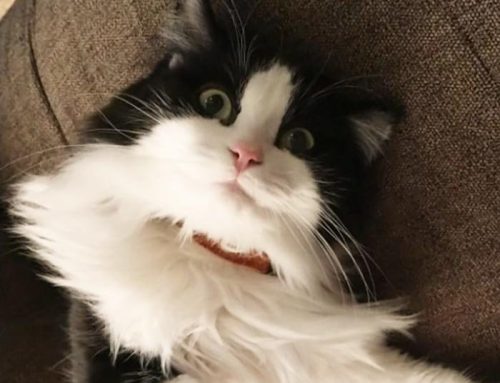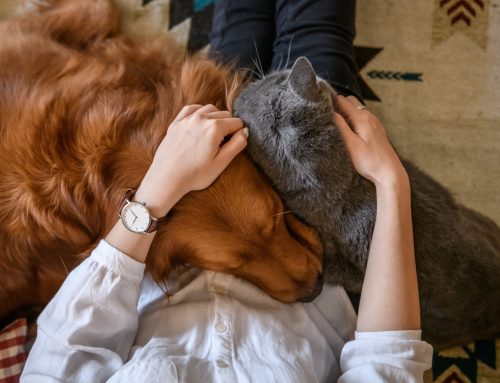Cat Diarrhea is not a disease but rather a symptom; it is an indicator of another illness or condition. Although it can be potentially fatal to cats if left untreated, the correct treatment reverses the problem quickly with marked success.
What is Cat Diarrhea?
Cat diarrhea is characterized by loose, watery, ‘cow patty’, frequent, insistent and smelly stools that is often accompanied by abdominal discomfort, gas, straining, and vomiting.
Cat diarrhea should always be considered a possible health crisis, as cats are extremely susceptible to dehydration that can lead to further, potentially fatal, problems. Make sure pure, clean water is available at all times and monitor your pet for other signs of illness. Always consult a holistic veterinarian if your cat develops a case of diarrhea that lasts more then a few hours or if other symptoms arise such as lethargy, vomiting, fever, or discomfort.
Whether acute or chronic, nothing can put a damper on your day like a cat with diarrhea. Where a dog will allow their humans to console and pamper them when they are sick, by the time a cat is actually showing signs of illness, they are far worse off then they appear, making treatment more urgent.
Diagnosing: Why is Diarrhea Occurring?
There are many reasons why your cat may be suffering from a bout of diarrhea. To make an educated diagnosis, it is necessary to look not only at the obvious problems, but also at the ones your cat may be hiding from you!
Your veterinarian will first ascertain whether this is a mild case of diarrhea or a major incident before proceeding as well as whether it is localized to the small intestine, large intestine or both. They will exam your pet, looking for other symptoms such as whether your cat is running a fever, hydration level, gum color, heart rate, check for blood in the stool, body condition, and palpate or feel your pet’s abdomen for masses, discomfort or anything else that may seem amiss. Depending on what they find, they may suggest blood work, x-rays or perform a fecal smear or flotation test. Once a diagnosis is made, treatment may include fluids if your cat is dehydrated, medication, and sometimes an adjustment in their diet.
Stress or Life Changes The Vet may ask how long the cat has been suffering from the diarrhea, if your pet has experienced any changes recently, or whether they have been exposed to potentially sick animals.
Diet The most common cause of sudden onset or ‘acute’ diarrhea is often diet related, usually caused by a sudden change in food or eating food that has turned rancid. Although explosive diarrhea is catastrophic at the time, by restricting access to food for half a day and slowly introducing the new food, it should quickly clear up.
Food Allergies Food allergies or the wrong food entirely is often the cause of ongoing cat diarrhea. Although food allergies are not as common in cats as they are in dogs, they do happen and itchy spots on the skin around the head and tail base often accompany the diarrhea. In this case, gradually changing the food to a hypoallergenic formula or homemade diet with little to no wheat, gluten or corn over the course of a week should alleviate any chronic diarrhea.
Bacteria or Parasites Other causes of acute diarrhea in cats can be bacteria exposure or parasitic infestation.
Often your veterinarian may not be able to make a quick diagnosis of what is the cause of the chronic diarrhea in your cat. Instead, there may be a series of ongoing tests in an attempt to ascertain the cause with the chronic diarrhea only being a small but obvious indicator that there is something really wrong with your pet. The final cause may be something seemingly unrelated to the feline digestive system so do not leave anything out when discussing your pet with your veterinarian.
If the diarrhea continues, further x-rays may be suggested as well as procedures such as endoscopy or exploratory surgery. Both endoscopy and surgery allow the vet to take biopsies of the digestive tract that are then sent to the lab for testing as well as check for abnormalities or foreign objects your cat may have swallowed that are causing the problem.
Vitamin Supplements to Restore Cat’s G.I. Health
No matter what the cause of cat diarrhea, restoring your cat’s GI health is critical step to alleviating the diarrhea if not correcting the problem entirely. A healthy digestive tract is an essential part of your cat’s continued good health and by supporting normal function you know your pet is able to absorb the necessary nutrients to fight the cause of their ill health. Although not always a solution to the problem, your cat will display better overall health with less diarrhea or other condition related symptoms.
A cat with diarrhea does not have to ruin your day! Put away their food, watch for other symptoms and do not hesitate to take your furry family member to a holistic veterinarian if he starts to deteriorate.






We admitted an adopted cat to the hospital to find out the issue with a chronic discharge from the nose, roughly, in February or March. They found three viruses (one that made him blind in one eye) and put him on antiviral medication. He is now on Prednisone. He has had diarrhea ever since. We have tried probiotics and it is not helping. Sometimes he does vomit, but not that often. My friend told me to try Dia-rez (or something like that), and I can’t seem to find it. Please help. He is such a nice cat. I do have him on filtered water, but he is also drinking water right from the faucet.
Hello,
I will reply directly to your email.